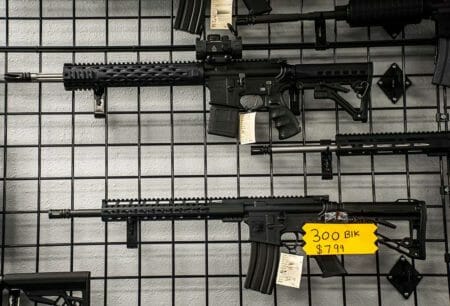#2A SUPREME COURT GRANTED CERT in Merrick Garland Attorney General US v Michael Cargill bump stock lawsuit. Can the ATF create law? https://t.co/dLppsODkWA pic.twitter.com/YSqA9G1zOD
— Michael Cargill (@michaeldcargill) November 3, 2023
The Supreme Court of The United States (SCOTUS) will decide if the Bureau of Alcohol, Tobacco, Firearms and Explosives (ATF) overstepped its authority by reclassifying bump stocks to machineguns.
The case, Cargill v. Garland, was bought by Texas gun store owner Michael Cargill with the help of the New Civil Liberties Alliance (NCLA) against the ATF’s regulation on bump stocks. For years, the ATF maintained that bump stocks were legal and did not meet the definition of a machinegun. Many Americans purchased the item even though many others believed the product to be a gimmick.
A bump stock replaces the pistol grip and stock of a semiautomatic rifle with a unit that is allowed to slide. This innovation and forward pressure on the handguard allow the firearm’s recoil to reset the trigger, enabling the shooter to fire rapidly. The gun only fires one round per function of a trigger and, therefore, doesn’t meet the definition of a machinegun as defined under federal law.
In 2017, a mass killing took place at the Route 91 Harvest Country Music Festival in Las Vegas, Nevada. The killer murdered 58 people and wounded 413 other concertgoers by firing on the crowd from the 32nd floor of the Mandalay Bay Hotel and Convention Center. Law enforcement authorities claimed to have recovered several AR-15s from the hotel room and alleged that several were equipped with bump stocks.
Immediately, there were calls to ban the device from anti-gun politicians and activists. Then President Donald Trump gave into pressure and directed the ATF to ban the devices.
The ATF would use Chevron deference to issue a new rule that would redefine a bump stock from a simple accessory to a machinegun conversion device. Chevron deference states that if a statute is unclear, the regulating agency interprets the regulation.
The plaintiffs in Cargill claimed that the legal definition is not ambiguous. They claim the definition of a machinegun is clear, and bump stocks do not meet the definition that Congress laid out. They also claim that Chevron deference was never intended to be used in a criminal statute. Only Congress can make laws, and the Administrative Procedures Act (APA) prevents an agency from making de facto laws.
The plaintiffs also claim that even if the law was unclear, the ATF’s bump stock ban violated the rule of lenity. The rule of lenity is a principle of criminal statutory interpretation that requires that when a law is unclear or ambiguous, a court must apply the law in the manner that is most favorable to the defendant.
The Fifth Circuit Court of Appeals agreed with the plaintiffs. By a margin of 13-3, the court struck down the ATF’s rule.
This court decision would be a different conclusion from other Circuit Courts, causing a circuit split. The federal government would petition SCOTUS for a writ of certiorari, meaning it wanted SCOTUS to hear the case. It would also ask for a stay on the Fifth Circuit’s decision.
SCOTUS would grant the ATF its stay while deciding whether to grant cert. Now, the Supreme Court has agreed to hear the case.
The outcome of this case will have a rippling effect across other ATF’s rules. A positive outcome could help knock down ATF’s rules on pistol braces and privately manufactured firearms (PMF). The gravity of the case isn’t lost on Michael Cargill.
“Five years ago, I was told to not put up a fight and let the government take bump stocks,” Cargill told AmmoLand News. “I chose not to listen, and now the Michael Cargill bump stock case has the chance to save all firearm parts and accessories.”
There isn’t a timetable for oral arguments in the case, but the gun world is watching with bated breath.
About John Crump







I’ve long thought of bump-stocks as very efficient ammunition depletion devices. My ammo costs are high enough that I really don’t want to “spray and pray” at the range. That said, I can find no logic in banning them and I think that the BATFE is operating way beyond it’s authority. Law making is reserved to congress critters, not government offices and bureaus.
Politicians using illegal laws for control
Excellent. SCOTUS needs to smack down BATFE for their criminal acts. Chevron cannot be applied when criminal law is at stake, nor can agencies create or alter criminal law. BATFE is trying to send citizens to prison for a decade and fine them $250,000 for possession of a piece of plastic, and attempting to redefine machine guns in plain violation of statute. Bump stock, receiver and brace rules are all garbage they had no authority to create.
So the Communist representatives in OUR Government are trying to use the MESSED UP COURT SYSTEM to make law?!?!
NEWS FLASH!
ONLY CONGRESS has the POWER and LIMITED AUTHORITY TO MAKE LAWS that AGREE with Our American Constitution’s GUIDELINES! Bureaucrats in any Department, whether legally instituted or ILLEGALLY instituted(atf) DO NOT HAVE AUTHORITY to REINVENT/REINTERPRET LAW! ESPECIALLY when that REINTERPRETATION carries a CRIMINAL FINE or PUNISHMENT VIA IMPRISONMENT!
I can get my Camel Spider to run at a pretty impressive rate with the Franklin Armory Binary trigger on it… hold the stock a little off your shoulder and the magic happens.
I suppose they’ll come after those next.
ATF ” Outlawing Lawful Fun” . that should be their new motto.
Why do we allow the atf to outlaw full auto guns in the first place? Any and all gun laws are unconstitutional. Thats is it that is all. I want my RIGHTS back. From a BB gun to a nuclear weapon no ass hat in a government position gets to tell me shit!!
SCROTUS…….LOL!
Check out the link below. Part of the story is not being told here and that is that there were multiple shooters. I believe the guy being blamed was set up and their is a video on the incident over 2 hours long that was on Ammoland that no longer works but is still on youtube. When it comes to mass shooting have you ever noticed how this is never mentioned? Did you notice how quick the media dropped the story? I have never fired a rifle with a bump stock and from the people that I have spoken with… Read more »
i have been asking this same question for years. agencies enforce laws not make them. America need congressmen who are not ego maniacs and and law bidding citizens not dictators wannabes.
Depending on the wording, a positive ruling could also overturn the BATFE’s ruling on the various triggers that are forcibly reset and the ATF incorrectly labels as machine guns.